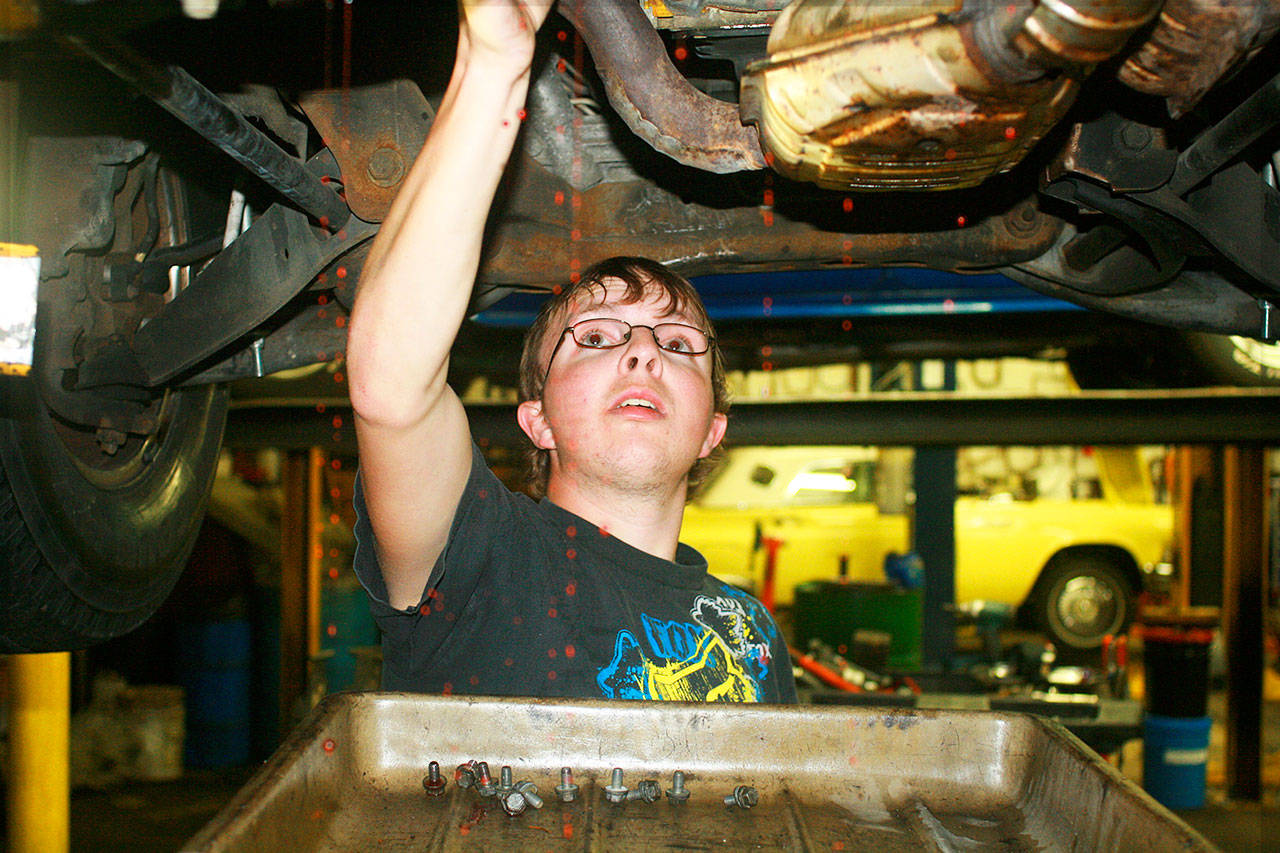Lucas Etzell answered the phone and carried on a polite conversation before ending the call with, “OK, I’ll bring it.”
The transaction was simple: The caller wanted a pizza, and Etzell was asked to deliver it.
Yet Etzell wasn’t at a pizza joint. He was in a classroom, specifically the main room of the transition program of Oak Harbor Public Schools.
The program helps students with developmental and learning disabilities successfully transition from high school into adult life.
Etzell, who happens to have Down Syndrome, created a pizza delivery business as part of his work in the program. Essentially, Etzell takes pizza orders from district personnel, retrieves the pies from Little Caesars and delivers them on time.
This efficiency has boosted Etzell’s confidence, prompting joyous declarations of, “I’m Mr. Whidbey Island.”
Diane Fesler-Macaluso, transition coordinator for Oak Harbor Public Schools, says Etzell’s progress is a perfect example of the life skills that can be cultivated by the transition program. She said the program seeks to develop personal social skills in tandem with employment skills in her students. While employment skills help her students get jobs, social skills keep them employed, she explained.
It’s little things like shaking hands, making eye contact and providing guests with hospitality that make the difference, she said.
Indeed, when a guest enters the transition classroom, which is located in the rear of the district’s Administrative Service Center, each student stands up, shakes the guest’s hand and introduces him or herself by name, all while making eye contact.
Though many people take these gestures for granted, Fesler-Macaluso said her students could be labeled as rude or disrespectful if they didn’t make use of them. According Fesler-Macaluso, learning these social norms grants her students the ability to leverage their employment skills into becoming a fixture at a job site, rather than a novelty.
One of the strategies the transition program uses to help the students gain such employment skills is to partner with the community.
“We have at least 37 business community partners,” Fesler-Macaluso said. “We try to put students in internships where they have an interest.”
Doug Miller, 19, showed an interest in the automotive industry, so the transition program helped secure him an internship at Gateway Transmissions. To name a few more, classmates Sall Sutalo-Powell, Gryphon Frampton and Josh Lanham work at Alfy’s Pizza, China City and Burger King respectively.
These students, and their classmates, aren’t just thrown to the wolves. They have job coaches such as Tanya Constant, a career specialist for the transition program, who help them every step of the way.
“My job is to show the kids how to do their job — find out what they want to do, what their strengths are and then get them ready for real-life scenarios,” Constant said. “This is my calling. I love every little thing they can do or a new task they learn. It just makes my day.”
Constant said nothing is more rewarding than getting a phone call from a former student informing her of an upcoming job interview.
Fesler-Macaluso said the transition program also helps families learn how to navigate and negotiate the adult service providers that each student might need post-graduation.
By the time students are in their final year in the transitions program, Fesler-Macaluso and her staff begin the final transition between school and work with them.
To fit that need, Island County Developmental Disabilities Administration, Division of Vocational Rehab, or DVR, and Oak Harbor Public Schools, partner together to transition students from their community internships into paid positions. Job coaches from the school district hand off their students to the support network of mentors from Island County or DVR.
This partnership, called School to Work, has a 100-percent success rate for eligible students finding employment by the age of 21. This year has also seen success, with all eligible students receiving job offers or heading to college.
However, the School to Work partnership is only guaranteed to function through 2018, Fesler-Macaluso said, adding that the program is undergoing some tough scrutiny.
“School to Work is under fire from DVR,” Fesler-Macaluso said. “There’s a lot of stuff going on with DVR as far as youth employment goes. In my view, from what I’ve read and what I’ve heard… School to Work is in jeopardy.”
Representatives from the Oak Harbor DVR were unavailable for comment, but Fesler-Macaluso said that the organization is likely grappling with mandates handed down from the state level.
Regardless of the status of School to Work, Fesler-Macaluso said the transition program will continue its good work.
“Our students have proven over the years that they are really capable of working, of being held to a high standard, of working right along side somebody who is not labeled with a disability,” Fesler-Macaluso said.



